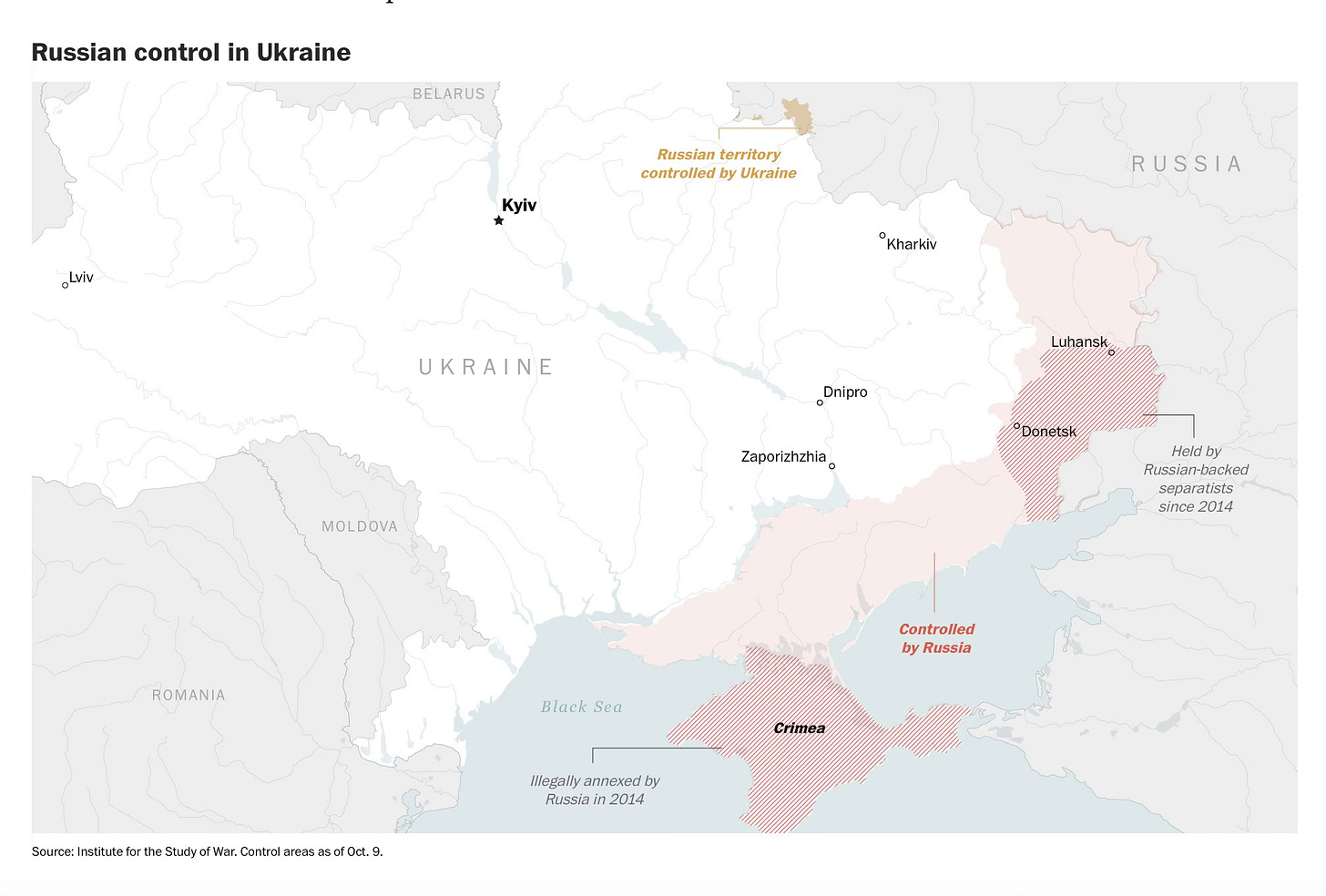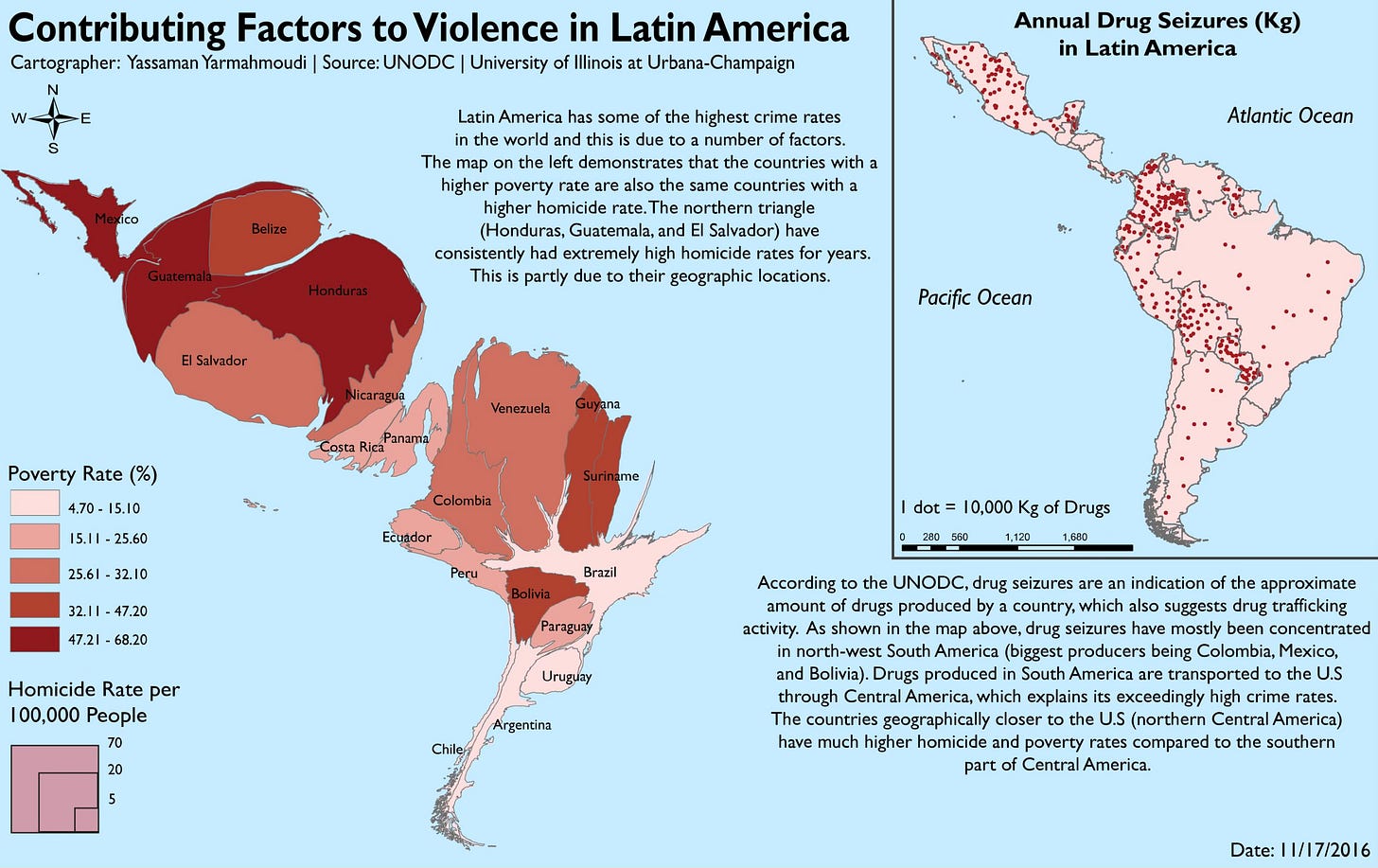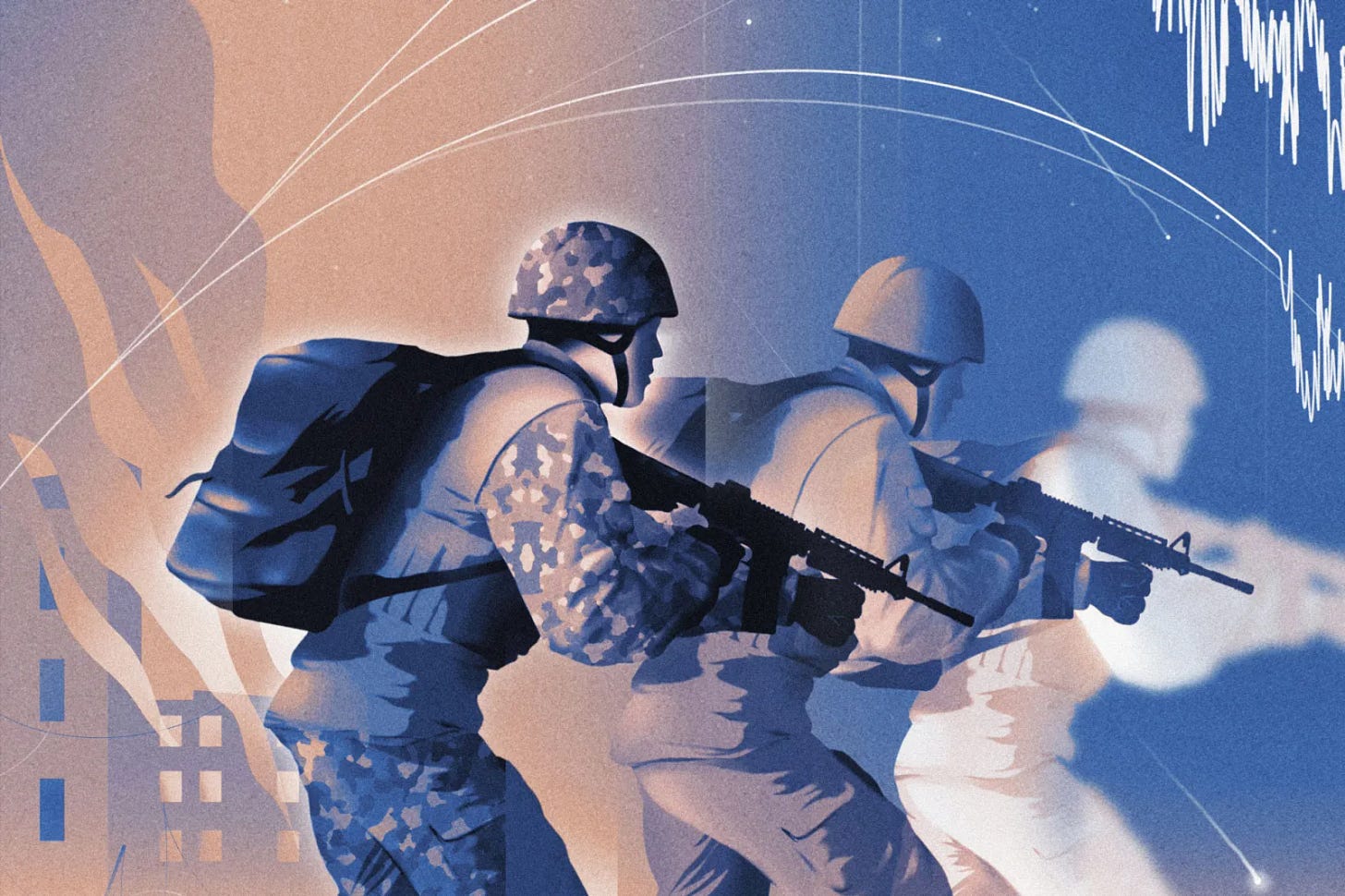This is one depressing cutdown … as I am feeling nothing good nowadays, and I blame the upcoming election.
I also suspect subbing Zyrtec for Allegra D 24-hour these past few days.
God almighty! I want out of south-central Ohio!
1) The sad state of (Republican) politics in America
WAPO: Republicans lean into anti-transgender message in closing weeks
The Dems are closing on the subject of Trump’s fitness, authoritarian impulses, etc. To me, that’s fair game because it speaks to his performance and tendencies.
The GOP is closing hard on transgender issues:
In one ad by a Trump-aligned super PAC, an image of Harris talking to a drag queen is followed by a narrator intoning “Crazy liberal Kamala is for they/them. President Trump is for you.”
A clever bit of otherizing.
The strategy is part of a broader push by Republicans to make attacks on transgender rights a piece of the party’s closing message. Republicans running for Senate are spending millions of dollars on anti-transgender ads in swing states. They hope the theme will resonate with, say, suburban moderates who are uncertain whether transgender girls should be allowed to play girls’ sports, just as much as it does with the rally-going MAGA faithful.
That’s kind, to say the least: the assumption that transgenders don’t exist in suburbia, where “moderation” reigns.
Well stated, WAPO!
In truth, it is outright bigotry and fear-mongering against a most vulnerable group within society. It is the essence of bullying because the bullies in question know full well they can get away with it.
Transgenders were estimated (by UCLA Law) to number roughly one and a half million souls within the US population of 330 or so million (back in 2016) to yield a percentage share of one-half of one percent. That means roughly one in every 200 Americans identifies along these lines, which is just about perfect for political uses because it means they’re basically everywhere and almost completely invisible.
And, if you want to shame them (in your opinion), then you simply show pictures of the most outrageously dressed drag queens and — in a brain-dead conflation — claim that somebody like that is going to start playing JV girls basketball against your daughter.
This is, of course, a perfect wedge issue because it’s flagrant and mostly non-existent in the average person’s life, so it’s low-cost, low-calorie discrimination. US states with HS athletes numbering in the hundreds of thousands report transgenders barely in the double digits. So, we’re talking a “threat” in the one-ten-thousandths of a percent range.
You might as well pass laws against meteors killing people.
When you pass laws targeting law-abiding groups that small, then, by definition, it’s discrimination.
What does the GOP have to say about climate change other than “drill, baby, drill”? Not much.
But, sure, fill the airwaves with ads accusing Dems of trying to place transgenders on your kids’ sports teams, as these unicorns must be targeted before Western civilization falls.
This is what the GOP is selling today, and I gotta tell you, I miss the old GOP — badly. I had no problem working with them and for them back in the day. But today? It’s almost impossible to imagine, and that strikes me as dangerous all by itself.
We simply do not inhabit the same America.
2) Uhhhh, yeah!
CFR: Is the United States Losing Ground to China in Southeast Asia?
Joshua Kurlantzick is a smart China-watcher, particularly when it comes to Beijing’s global influence peddling.
Historically, Southeast Asian countries, with rare exceptions like the Philippines today, have tried their hardest not to side clearly with either of the two regional giants, China or the United States. But, there are increasing warning signs that the United States is losing influence to China in the region. These signs do not mean that Southeast Asian states would necessarily side with China if there were a military conflict over the South China Sea or determine how they would act if there were a war over Taiwan. It further does not mean that most Southeast Asian states are unperturbed by China’s increasing militarization of the South China Sea, claims on disputed areas that may have significant oil and gas deposits, or Beijing’s notably more aggressive and dangerous tactics toward boats from the Philippines, Vietnam, and other countries in waters China claims as its own.
Stipulating all …
Trump backed us out of the Trans Pacific Partnership and Biden has done little to nothing to fill that gap:
Many Southeast Asian states, already massively dependent on China for trade (and sometimes aid and investment), have become frustrated with the lack of a coherent U.S. trade policy toward Asia over the past four years. While the region embarks on a rapid series of trade deals, some of which support and supplement each other, the United States is not a participant and has offered modest economic incentives through its Indo-Pacific Economic Framework (IPEF).
Kurlantzick points out that recent rigorous regional polls indicate that China has edged out ahead of the US — for the first time — in all measures of influence, with just over half of respondents now saying that, if push came to shove, they’d have to side with China over the US.
In effect, economics trumps geopolitics because sheer proximity beats mere presence.
As I wrote in America’s New Map:
Will America be the primary agent of regional integration in Asia?
While we played the security “glue” role in previous decades, China’s rise clearly supersedes that dynamic, so no. There is no stopping China’s emergence as Asia’s economic hub, and any talk of doing so to spare our regional allies that fate is fantasy. Yes, our nuclear umbrella will still extend there, and we can certainly rally the region’s democratic pillars (India, Australia, New Zealand, South Korea, Japan) through coordinated policies, arms sales, and military cooperation. But each of these powers will invariably need to strategically accommodate Beijing’s economic domination, and those individual choices will define Asia’s future far more than any US strategy. This is not a dire situation: our allies constitute a powerful economic bloc backed by strong militaries. They are entirely incentivized to press their strategic interests with our support.
Where this dynamic strikes me as far more dangerous is throughout the Global South, where both the economic strength and professional militaries are absent as local counterweights.
3) The forever war with no US casualties
WAPO: Are Americans ready to give up on Ukraine?
Robert Kagan is worrying about the election and its impact on US support to Ukraine, as well he should.
As the war in Ukraine continues to drag on with no obvious good end in sight for Ukrainians, folks who are not Ukrainian have begun talking about and yearning for a negotiated settlement. As National Security Council spokesman John Kirby recently put it, “A negotiated end is the most likely outcome here.” And we know what that means for Ukraine. As Czech President Petr Pavel, a longtime supporter of Kyiv, bluntly put it: Ukrainians “will have to be realistic” and understand that “the most probable outcome of the war will be that a part of Ukrainian territory will be under Russian occupation, temporarily.”
The irony of a Czech leader urging this course on Ukraine will not be lost on those with a sense of history: it was exactly the advice offered to Czech leaders in 1938 by the “realists” of the day.
Deep-cut ouch!
Kagan’s point is a sharp one:
Today, it is the Ukrainians who are being urged to abandon the romantic path of hopeless resistance and pursue the heroic path of realism. But if they do, what is to stop Russia from taking the rest of Ukraine whenever it is ready?
Because that is totally’s Putin’s MO: invade, plead for a deal that grants him territory (How reasonable!), freeze the conflict for a few years, and then rinse-and-repeat.
As stated here before, the only deal I could stomach would involve territorial loss in exchange for expedited entry into the EU and NATO. That would at least be freezing the conflict on our terms, which is why Putin wouldn’t go for it unless his regime was cracking up and he had no choice.
So, putting that aside: if you want to truly big-picture this conflict, to me, it’s a twofer:
Decimating Russia’s military for as long as Ukraine can put enough troops in the field to carry on (and let’s limit those numbers the best we can by radically experimenting with nearly all-drone warfare to the greatest degree possible).
Leveraging this entirely sustainable (some treasure, no blood) effort for its maximal show-of-force impact on China’s calculations vis-a-vis Taiwan.
Kagan, as usual, pegs Putin perfectly:
Putin wants to see himself as a 21st-century Peter the Great, but with that outcome he will look more like the 20th century’s Nicholas II, who took Russia into a war that fractured its army, dismembered its empire, and, incidentally, led to the czar’s overthrow and murder and the end of the more-than 300-year-old Romanov dynasty.
And yes, I do have an analytic crush on Kagan. Always have. Whenever an interviewer has asked me: To whom do you look up in your field? I always say Kagan and really Kagan alone. He writes books that I covet.
4) And who’s to blame for that?
WAPO: Unbridled crime puts Latin American democracy at risk
Unbridled crime puts everything at risk.
Mexico’s transition to multiparty democracy a quarter of a century ago was a good news story, generally, but with a big asterisk: an explosion of organized crime.
Breaking the Institutional Revolutionary Party’s decades-long control of government destabilized a system under which the PRI, as it was known by its Spanish initials, contained drug cartels by negotiations and private understandings. As government power fractured, however, the criminal ecosystem took advantage and escaped these tacit limitations.
Similar processes have shaped the growth of organized crime across Latin America.
Who is to blame — ultimately — for the drug cartels?
We are, of course, which means we’re responsible for ham-stringing democracy throughout the region, leaving it unduly corrupt.
The fix (besides ending the Drug War) is obvious: spread economic connectivity and opportunities through North-South trade and investment integration. It fits our desire to de-risk our relationship with China on supply chains. It helps on immigration pressures. It takes on China in our “backyard.” It’s smart and good and profitable on so many levels.
Honestly, we are the worst kind of superpower neighbor — a situation rather easily fixed.
Or we can continue to tolerate this:
Armed to the teeth (mostly with weapons bought in the United States) and exercising control over billions of dollars and swaths of territory, criminal organizations arguably pose as much danger to liberal democracy today as power-hungry military officers did in the 1960s and 1970s. They are terrorizing the citizenry.
It is the pervasive weakness of the justice systems across the region that should be our primary aid focus, but all that takes a back seat to our War on Drugs — the primary feeder of that chronic incapacity.
Toss in the stress of climate change on top of all this and ask yourself? Are any of these small-to-medium countries better off trying to navigate this century on their own or as part of some larger, US-centric union?
I triple dog dare you!
5) Africa will be no different on fertility — just later
NYT: How a TV Hit Sparked Debate About Birthrates in Africa
The TV show in question is about a “wealthy serial divorcé who had had 20 wives and so many children he had lost count — and was too stingy to support them.” It is stirring debate in incredibly fertile Nigeria about the challenges it creates, along with the opportunities:
The show’s theme — the consequences of having many children — has struck a chord in Nigeria. It is a pressing issue for many in Africa, where a protracted baby boom is fueling the youngest, fastest-growing population on the planet, even as birthrates plummet in richer regions. The scale of this youth boom opens up enormous potential opportunities for global influence and possibly economic growth, but also huge challenges for societies that need to educate and employ all of these people.
As I have said here many times: we will see more and more of these stories over the coming years, as we move toward a mid-century reality (2050) where one out of every four people (2.5B) on this planet will be African and half of those Africans (1.25B) will be young (under 25).
Here’s your demographic transition trigger in a nutshell:
In Kano, a religiously conservative city, large families are considered a blessing and a sensible bet to ensure care in old age.
But for many in Kano — and across Africa — the economic and social calculation is changing.
Families used to live in large compounds, the children cared for by a whole extended family. Now, they increasingly live in smaller units in urban areas, putting parents under more pressure to provide. Far more children survive into adulthood than did 40 years ago, when one in five African children died before turning 5. Contraceptives are now more available and less controversial than before. And education is accessible and desired — including education for girls, which has been shown to reduce birthrates.
Africa is just boarding the one-way train that is the demographic transition: still procreating at a rural rate while urbanizing rapidly, a huge one-time-only behemoth generation is birthed. Africa, as that baby boom segues into a youth bulge segues into a demographic dividend, MUST integrate its economies into global value chains that provide both jobs and consumption opportunities for a generational cohort that Africa’s many (almost 60) governments either satisfy, or succumb to, in terms of political instability.
And yeah, we’re asking the world economy to make that work RIGHT as climate change peaks across the continent, with China and India and the PG monarchies as the primary integrators.
Say your prayers, because we’re going to need a bigger boat.
6) Fast forward on a future of megadroughts
NYT: An Alarming Glimpse Into a Future of Historic Droughts
It is a stunning recitation:
Electricity cuts across an entire nation. A capital rationing water. A mayor encouraging people to shower together to save precious drops. The world’s largest river system, the Amazon, which sustains some 30 million people across eight countries, is drying up.
A record-breaking drought that is well into its second year is punishing much of South America, including the Amazon rainforest, upending lives and local economies and providing an alarming glimpse into the future as the effects of climate change become more apparent.
In Brazil, wildfires fueled by searing heat and prolonged dry conditions have consumed vast swaths of forest, wetlands and pastures, with smoke spreading to 80 percent of the country. It has led to canceled classes, hospitalizations and a black dust coating the inside of homes.
With much of South America dependent on hydropower, electricity production has plunged. In Ecuador, people are enduring energy cuts of up to 14 hours per day, knocking out the internet and sapping the country’s economy.
In Colombia’s capital, Bogotá, the government is cutting water to residential homes at regular intervals and the mayor has suggested that people “bathe as a couple” to reduce consumption.
Long sections of the Amazon River have turned into dry, brown beaches, and officials are dredging sections to make them deeper.
I ask again: Does this seem like a problem set that small-to-medium countries across the region can handle on their own?
Any reason to think the environmental situation will improve?
Then what are we waiting for? I mean, other than the climate migrants massing at our borders?
Two types of people this century: those put on the move by climate change and those forced to deal with them.
7) Everything everywhere all at huh?
FOREIGN AFFAIRS: The Return of Total War
I will admit: I find this article to be supremely impressive and supremely unimpressive at the same time. I read individual sentences and they make sense, but I’m entirely baffled that they — in sum — constitute a defensible thesis that declares we have re-entered an era of total war that was somehow absent across the Cold War and post-Cold War periods right through the Global War on Terror.
I mean, is Russia going into Ukraine all that different from the US going into Vietnam and taking on the Viet Cong and North Vietnam and its socialist bloc backers? That was limited for all involved, except, of course, for the two Vietnams.
Is Israel taking on all comers in all shapes and sizes all that different from what’s been going on there for decades?
Is any of this more connected to the threat of nuclear war than any of the world’s many conflicts across the Cold War?
I just don’t get it. I’m not seeing “total war” of the kind that Sherman waged in 1865 or Goebbels attempted to marshal in 1943 or Japan threatened with regard to a prospective US invasion of the islands. I’m seeing Ukraine on a war footing, Russia somewhat so, and helpers on both sides nowhere near anything like that.
Author’s argument:
In both Ukraine and the Middle East, what has become clear is that the relatively narrow scope that defined war during the post-9/11 era has dramatically widened. An era of limited war has ended; an age of comprehensive conflict has begun. Indeed, what the world is witnessing today is akin to what theorists in the past have called “total war,” in which combatants draw on vast resources, mobilize their societies, prioritize warfare over all other state activities, attack a broad variety of targets, and reshape their economies and those of other countries. But owing to new technologies and the deep links of the globalized economy, today’s wars are not merely a repeat of older conflicts.
If you take the total war bit out of the piece (or just substitute it with “grey war”), it’s an interesting survey of conflict around the world right now, but it’s not a new era, in my mind. The argument simply does not cohere, particularly the bit about the “return of deterrence.” Like it ever went away?
Drones are introduced but rather summarily so, when I would define them as THE new modality of note.
This is exactly where she lost me. I read the first graf and go, okay, now prove it, and then read the second paragraph and say, huh?
Just under a decade ago, there was a growing consensus among many experts about how conflict would reconfigure itself in the years ahead. It would be faster, waged through cooperation between people and intelligent machines, and heavily reliant on autonomous tools such as drones. Space and cyberspace would be increasingly important. Conventional conflict would involve a surge in “anti-access/area-denial” capabilities—tools and techniques that would limit the reach and maneuverability of militaries beyond their shores, particularly in the Indo-Pacific. Nuclear threats would persist, but they would prove limited compared with the existential perils of the past.
Some of these predictions have been borne out; others have been turned on their heads. Artificial intelligence has in fact further enabled the proliferation and utility of uncrewed systems both in the air and under the water. Drones have indeed transformed battlefields—and the need for counterdrone capabilities has skyrocketed. And the strategic importance of space, including the commercial space sector, has been made clear, most recently by Ukraine’s reliance on the Starlink satellite network for Internet connectivity.
I am left wondering which part got turned on its head.
Author is obviously accomplished and smart, but I feel like a good editor would have forced a much better product — at least an argument that makes sense to the point where I could track it
Am I missing something here? Or is this the conceptual salad it appears to be?
All I know is that I’ve read it several times and am still frustrated to walk away without a singular clear thought about what it told me.
Curious what anybody else thinks.
8) Democracy dies from disuse
NPR: 'Washington Post' won't endorse in White House race for first time since 1980s
What a year to return to one’s “roots.”
This really does feel like Bezos protecting his business interests, which puts him in the same grubby neighborhood as Musk.
Screw democracy, I want mine!
Post owner Bezos, the Amazon founder and one of the world's richest people, has major contracts before the federal government in his other business operations, with billion-dollar implications affecting Amazon's shipping business and cloud computing services as well as his Blue Origin space company.
A profile in courage Bezos is not.
9) Meanwhile, back in Berlin 1933
WAPO: No, Trump is not literally Hitler. So what is he?
Spot the similarities:
A political leader whose popularity is driven by his personality more than his detailed policy proposals. Someone who casts a small segment of the population as dangerous and demands they be rounded up and deported. A leader who responded to losing an election by working fervently to overturn those election results, spreading false claims and stoking an anger that culminated in an attack on his country’s legislature. A leader who has endorsed the idea of replacing a nonpartisan governmental bureaucracy with loyalists. Someone who excoriates the press as dishonest, describes his political opponents as enemies worse than foreign adversaries, and is surrounded by voices that amplify and cheer his most extreme rhetoric.
Walk like a duck, quack like a duck, contemplate using the military on his domestic enemies like a duck … it’s all water off this guy’s comb-over.
Philip Bump describes how so many legit and respectable conservatives, like Hugh Hewitt once was, are now just sycophants. That’s the truly sad part for me, because it indicates how much people are willing to knuckle under to authority figures when they feel their core identities are losing their political centrality.
The walk-away:
There are two points worth reinforcing here.
The first is that the most immediate round of comparisons to Hitler was driven not by left-wing paranoia about a second Trump term. It was driven, instead, by Trump’s own words, as relayed by his former chief of staff ...
The second is that one of the first people to compare Trump to Hitler was Sen. JD Vance (R-Ohio), now Trump’s running mate. What changed since Vance offered that comparison in 2016 isn’t how Trump approaches politics. It’s how willing Vance has become to acquiesce to that approach.
The death of expertise? More like the death of irony and self-awareness.
What did Oppenheimer say about the Nazis’ chances with nuclear weaponry?
Oh … right, their anti-semitism would save us.
10) Your papers, please.
JALOPNIK: The U.S. Government Can Track Abortion Travel Through Your Cell Phone — Leaving your abortion-restricted state for medical care? Don't bring your cell phone
This is how I put it in America’s New Map:
Increasingly, our rights as Americans vary by geo-location, meaning rights we enjoy in one state disappear the second we cross over to another state— like abortion rights today. Now, right-wing extremists plot to tag red states’ citizens with legal restrictions designed to travel with them — ball-and-chain-like — whenever they step out of their designated home states. Replace bounty-hunting slavers with bounty-hunting forced-birthers and today we can say that Mrs. Dred Scott is alive and at risk if she is living in the wrong state.
As we citizens are trackable in real time, thanks to our smartphones, we are at risk of being subjected to overlapping, apartheid-enabling regulatory regimes that give lie to the notion that all stand equal before the law.
Imagine the scenario, I prompted:
… when your online search for abortion services suddenly shuts down your Tesla as you attempt to drive out of state.
Minority rule … minority report … pre-crime officers arresting you at the state line.
This is totally going to prevent Whites from lapsing into majority-minority status in the US.
11) Money, money, money
WAPO: A new influence industry is making millions from U.S. sanctions
This is expected and yet so depressing:
A sharp increase in U.S. sanctions has spawned a new lobbying industry in Washington, as businesses and governments around the world attempt to shape these economic penalties by hiring former U.S. officials to leverage their connections, a Washington Post investigation has found.
An avalanche of cash from abroad has flowed to former lawmakers and aides from both parties with experience at some of the highest levels of American government. One firm founded by several former senior Treasury Department officials has reaped tens of millions of dollars from the United Arab Emirates, which several watchdog groups, including Transparency International, describe as a hub of money laundering. Regimes accused of human rights abuses have turned to former members of Congress for help with sanctions. And a raft of foreign business entities — Kremlin oligarchs, Chinese tech firms, a Serbian arms dealer — has hired lobbyists to try to roll back economic penalties, or have them imposed on rivals.
The less developed the targeted state, the more deleterious the impact:
When a poor African country “hires another Washington lobbyist, that’s money that’s not available for schools, for hospitals,” said W. Gyude Moore, a fellow at the Center for Global Development, a Washington-based think tank. “But because we’re throwing sanctions around like peanuts to birds,” Moore said, “it’s been a booming business for Washington.”
This self-licking-ice-cream-cone (pass sanctions as a lawmaker, rake in the bucks post-office) is yet another reason why we lose to the Chinese across the Global South.
12) There is no surprise why America has the worst infant mortality rate among advanced economies
WAPO: Infant mortality got worse after Roe reversal. Experts are investigating.
JAMA PEDIATRICS: National Trends in Infant Mortality in the US After Dobbs
The finding:
Hundreds more babies died than expected in the year and a half after the Supreme Court ended the constitutional right to abortion in June 2022, raising questions about the ripple effects of the ruling on maternal and child health.
In findings published this week in JAMA Pediatrics, researchers said the shift was detectable several months after the decision. In some months, infant mortality jumped by as much as 7 percent, or 247 excess deaths, from the baseline before the Dobbs v. Jackson Women’s Health Organization ruling, which overturned Roe v. Wade.
No mystery: more restrictions and bans on abortion force more women to take the damaged pregnancies to full term.
The good news? We’ve long led the advanced world on this fabulous score:
Who suffers the most within our ranks? According to one academic studying the issue:
“The people who are most marginalized are the ones being forced to carry pregnancies to term — those who are the poorest, with the least access to information.”
Sometimes I think the Roberts Court has no idea how much pain and suffering it is inflicting upon the public.





















On the Foreign Affairs piece, if the author thinks what's happening in Ukraine, Lebanon or even Gaza is "total war", she needs to go back to the history books. Total war, short of the nuclear threshold, is gloves off, folded up and put in a locked cabinet for a goodly while. Bomber Command didn't hold back on German cities, it calculated how it could cause the most damage and destruction: for Operation Gomorrah in 1943, they selected Hamburg because the city centre had a lot of wooden buildings and there had been a long period of hot, dry weather. They were actively looking for a tinder box. See also Stalingrad, Monte Cassino, the suppression of the Warsaw Uprising, the bombing of Königsberg. It's so far removed from even the most high-intensity conflicts at the moment. Total war wouldn't have seen Israel carry out a limited number of targeted air strikes on military sites across Iran, it would have flattened whole districts of Tehran.
such and odd and stressful time, days away from selecting from two different doors
door #1- lets compete, navigate the swirling currents of change with the best tools and resources available to any nation
door#2- shrink into a shell, pining for an unrecoverable (not to mention deeply flawed) past, aligning us with the worst leaders around the world
seems many lives are about to change